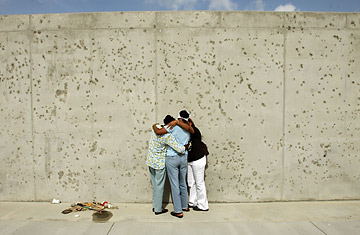
Mourners embrace at a levee wall that was breached during Hurricane Katrina in New Orleans
Much of this week, I've watched for New Orleans' painfully slow post-Katrina recovery to become a prime-time talking point from the Democratic National Convention's podium. Friday, after all, marks the third anniversary of the hurricane's arrival, and another powerful storm, Gustav, appears to be barreling toward my hometown.
So far, however, New Orleans' fate has been largely absent from the campaign conversation. Its few appearances have been more rhetorical than substantive — a way for the Democrats to attack the GOP's record rather than to propose what to do about a city that remains in crisis. Massachusetts governor Deval Patrick referred to it briefly: "The same folks who call themselves 'compassionate conservatives' are the same folks who abandoned all those people, not only after Katrina, but before the storm. The American people have had enough." Bill Clinton used Katrina to assail the Bush Administration for cronyism. Yet amid a riveting, potentially historic presidential race, New Orleans has become a three-year-old footnote.
The city where I was born and raised is still waiting for rescue. Three years ago this week, in the wake of the Katrina disaster, I returned there as a correspondent for the Wall Street Journal. What I saw upon arriving was a city that looked more like a Brazilian favela than one of America's most crucial ports. Riding through the streets on the back of a boat steered by a pair of shotgun-toting sheriff's deputies from Indiana, I saw colorless bodies bobbing in the water, often tethered to light posts. Water covered the top of the doors of my parents' church. God, my mom says, told her to flee the city a day or so before the storm's arrival. And so she did. Our house was destroyed.
Three years later, it has yet to be rebuilt, due mainly to issues involving the government and insurance companies. "I watch the BBC, where America goes to all these countries and rebuilds communities in a matter of days," my mom observed last night. "That just doesn't happen here. People are losing hope, people are tired." Nearly three-quarters of New Orleans' pre-storm population has returned since Katrina. Yet, in large swaths of the city, the fundamentals of community — schools, police stations, hospitals — have yet to be rebuilt. And don't get me started on grocery stores. When I went back to New Orleans for the Journal it was to explore a story on the paradoxical opportunity that Katrina, having wiped out so much of the city, could actually give New Orleanians a chance to escape poverty in a rebuilt city. Well, that opportunity, if it ever existed, has passed.
Now, Tropical Storm Gustav is coming. Already, Bobby Jindal, Louisiana's new, young governor, has declared a state of emergency. C. Ray Nagin, New Orleans' mayor, dashed back from Denver to help coordinate his city's evacuation plans. Yesterday, my mom booked my 70-something grandparents on flights to Dallas, where they'll stay with relatives. I reserved hotel rooms for my folks in Alabama in case they need them. My mom is a hard-core Barack Obama supporter who wants to hear him say at Denver's Invesco Field "We're going to rebuild New Orleans, at whatever cost, whatever it takes."
Yet in recent months Obama has been publicly silent about one of the gravest tragedies in American history. Perhaps that silence can be attributed to concern about being associated with a catastrophe that was cast in racially polarizing terms. But his silence is a missed opportunity. There is no better platform than New Orleans to execute many of the social-mobility policies Obama has vigorously promoted in other places like rural Pennsylvania, Iowa and Montana. Simply expressing sentiment over New Orleans isn't enough. We have had enough of platitudes. Any Obama statement must reflect a plan for resurrecting New Orleans.
This may be the city's only chance to be heard this campaign season. There's little reason to expect the Republicans to seriously address Katrina at their own convention in St. Paul. Katrina is a reminder of the Bush Administration's often bungled, uncompassionate response. So what will it take to get New Orleans back on the agenda? I am praying that the answer does not have to be Gustav.
